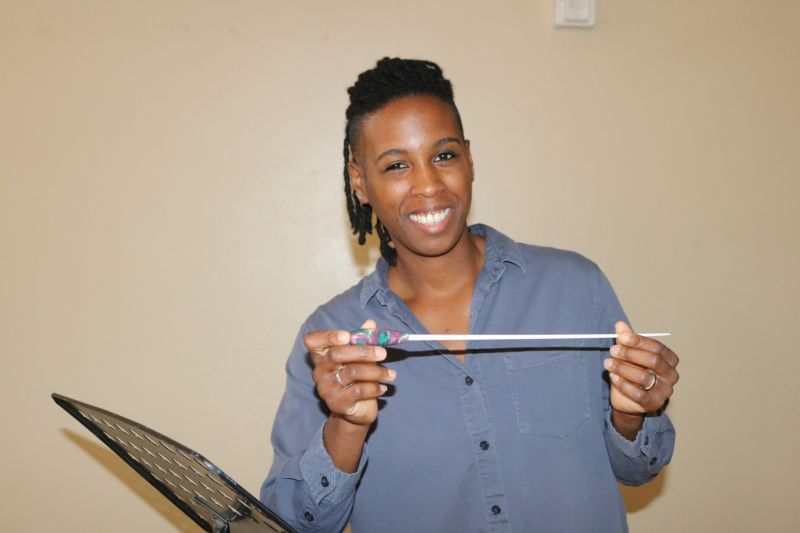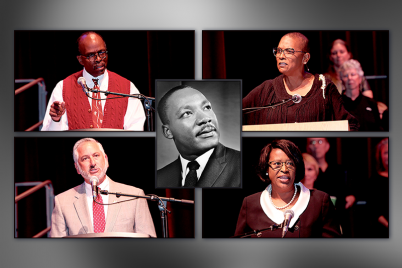Allendale United Methodist Church will play host to Tru’ Time Orchestra as they perform an instrumental dedication to Dr. Martin Luther King, Jr. on Sunday, Jan. 16 at 4 p.m., and Monday, Jan. 17, at 7:30 p.m.
BY J.A. JONES, Staff Writer
ST. PETERSBURG – On Sunday, Jan. 16 at 4 p.m., and Monday, Jan. 17, at 7:30 p.m., Tru’ Time Orchestra will perform Festival of Transcension: An Instrumental Dedication to MLK, at Allendale United Methodist Church, 3803 Haines Rd. N in St. Petersburg.
Classically trained multi-instrumentalist-turned-conductor Tru founded the orchestra. As a Black, female, queer, classical musician, Tru challenges our typical notions of who makes classical music.
Her musical resume – from being a violinist in the Tampa Bay Symphony to playing in the Florida Army Band to spending several years teaching at local Tampa Bay schools – adds a unique blend of experiences to orchestral works by Black composers.
With the tagline, “Classical Music is More Than Dead White Guys,” she is on a mission to share works by classical composers – dead and alive – whose works are less often heard.
“The whole idea behind it is essentially to elevate classical music by composers that are overlooked because of their skin color or because of race, and maybe their sexuality, their gender, all of those things,” Tru shared during a recent conversation.
She grew up with her grandmother, who was able to make sure she had access to various resources, including learning to play the piano; later, she picked up the violin. She ultimately went to Tampa’s acclaimed Howard W. Blake High School and declared orchestra as her major.
“Being at Blake was a really beautiful experience,” Tru recalled, noting that the school’s orchestra had a lot of diversity. But while she experienced the greatness of diversity at her high school, she soon saw a different world when she left.
“I would go to Blake, be at school and have this beautiful diversity, but then I was also in a youth orchestra that was connected to what’s now the Straz Center. And there was not much diversity there, which told me something a little bit more about the whole realm of the classical world.”
Tru said she didn’t face any starkly discriminatory experiences and was always encouraged by her grandmother and instructors to go as far as possible with her talent.
“If there had been [roadblocks], maybe I’ve overlooked them even though I know that they’re there. They haven’t truly personally affected me, but on a larger scale for orchestral musicians, it definitely is an issue for sure.”
Acknowledging the support for her musical studies provided by her grandmother, Tru noted that not many Black children have that kind of support to study music.
“Arts are the first things to be taken out of schools, especially predominantly Black schools. So, all those issues play into why you have little diversity when you get to a classical professional orchestra. Because the opportunities have been kind of stripped away before you even get a chance to get to a professional orchestra.”
After Blake, Tru continued her studies in piano at college before joining the army and ultimately the army band. Her post-army experiences included teaching at St. Pete’s Academy Prep and Tampa’s Academy of the Holy Names. While the students at each school were wildly different, Tru noted she brought her love of Black composers and their contributions to classes to both schools.
She also played with the Tampa Bay Symphony, which she called a good experience — although there was little diversity. Not only was she one of only a few Black people, she wondered, in terms of sexuality, if she were the only queer person in the orchestra.
Today, with her orchestra, she is trying to “cover all of those margins that are usually not acknowledged in orchestras.”
Of course, Tru’s musical career has encompassed a variety of genres; while classically trained, she said she’s often veered away from classical music.
“With violin, I actually discovered I can do covers of hip hop and R&B music, so I did that a lot in college, and then also before the pandemic,” she shared. “What’s kind of brought me back to classical music is conducting. But I’ve gone back and forth; I can’t say that I made the decision that I’m only going to be a classical musician.”
Tru was chosen as a recipient of the William Grant Still Initiative scholarship, which honors the legacy of William Grant Still (1895-1978), a pioneer Black conductor and composer of over 150 works. In 1936, Still became the first Black conductor of a major American symphony orchestra and, in 1955, conductor of a major symphony orchestra in the South.
Through the scholarship’s retreat, Tru was coached in conducting by Grammy-nominated conductor Kenneth Kiesler, who continues to mentor her to this day.
Currently, the music director at Allendale UMC, Tru will be conducting five works to honor the memory of Dr. Martin Luther King Jr., played by a 10-person orchestra on strings. The featured compositions are by Black classical composers Dorothy Rudd Moore, Adolphus Hailstork, George Walker, and 25-year-old composer Quinn Mason, whom Tru said, “He’s brilliant, and he needs to be showcased.”
For more information on Tru’Time Orchestra, including how you can join, visit www.trutimeorchestra.org/.













